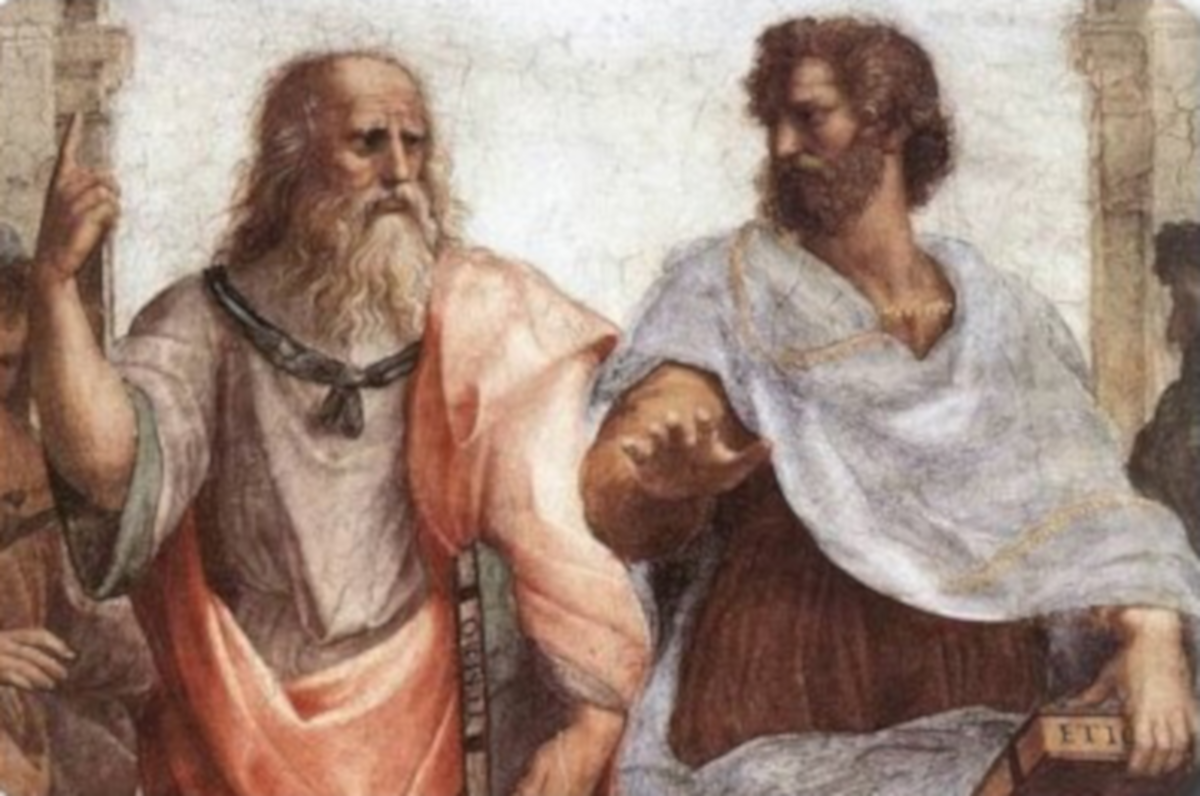The Birth of Western Philosophy
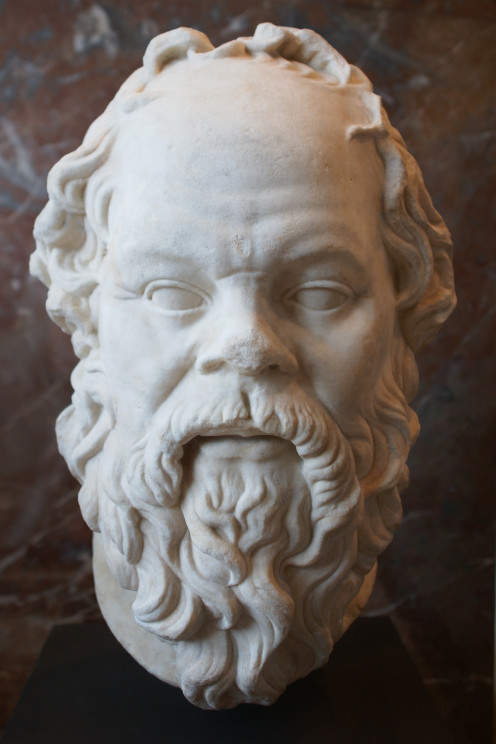
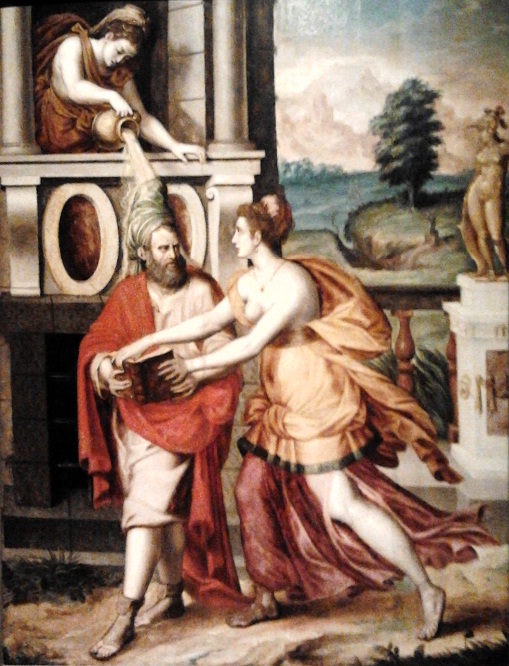
Socractes
Socrates was like some of my students, constantly running his mouth and never writing anything down. For this reason, his life story has always been a little questionable. If not for the writings of his students, Plato, Xenophon and the work of the Greek comedy playwright Aristophanes, everything about Socrates would have been lost to history. As it stands, we have to take their descriptions with a grain of salt as his students idolized him and Aristophanes was playing for laughs.
What we believe we know about his life is that his father, Sophroniscus, was a stonecutter and his mother, Phaenarete, was a midwife. Though Socrates presented himself as a commoner, some historians believe that his family had a much higher social status than originally thought. He was married to a woman, Xanthippe, who was much young than he, possibly 40 years younger, and she apparently loved to argue, which, according to Xenophon, is exactly why Socrates married her. Together they had three sons, Lamprocles, Sophroniscus and Menexenus. Unlike their historical father, however, Aristotle says the sons of Socrates amounted to very little.
Like all Athenian men, Socrates served in the military and fought in three battles during the Peloponnesian War, a war between Athens and Sparta along with their allies on the Peloponnesian peninsula. Following his military service, some say he fallowed his father in stonecutting while others dispute this. We do know that he served in the government, as all Athenian men did, but he was elevated to the level of the Boule, a council of 500 citizens who served one-year terms to run the everyday affairs of the city. During his time of service, he boldly refused more than once to go along with things he believed were morally wrong.
After his retirement, Socrates began to explore a life of philosophical thoughts. Unfortunately for him, Socrates felt no concern over saying whatever came to mind despite the fact that even though Athens was democratic, it did not allow complete freedom of speech. Socrates criticized democracy and even praised some aspects of Spartan life. These ideas were a slap in the face of the Athenian government, but for a time they ignored the mouthy old man.
Socrates might have gotten away with his negative opinions but he pushed the envelope even farther. The story goes that a friend of the philosopher, Chaerephon, had gone to Delphi to ask the Oracle if there was any man wiser than Socrates. When the Oracle said that Socrates was the wisest, Socrates did not believe it. Perhaps it truly was modesty, perhaps it was something more, but Socrates set out to prove the Oracle wrong. He went through town asking questions of all the men that the citizens of Athens considered wise, many of them the same politicians he had already angered. Eventually he announced that the Oracle must have been right after all because all of these men who thought they were wise, did not know as much as they thought they did. He on the other hand, was fully aware that he did not know everything. His knowledge of his own ignorance, therefore, made him the wisest.
This insult was the last straw. The politicians had him charged with corrupting youth, since many young students, like Plato, were following his every word. They also charged him with impiety, not showing respect to the gods. Socrates claimed he was innocent because he was not paid to teach his young followers, and he could not be held responsible for them following him around and listening to his ramblings. Socrates was found guilty on both counts.
After his conviction, the court asked Socrates what his punishment should be, but when he replied that they should give him a nice dinner and pay him for his time, it apparently did not help, as, according to Diogenes Laertius, a third century CE biographer, stated that 80 more men voted for his execution than had actually convicted him in the first place. A harsh sentence for being a smart-mouth.
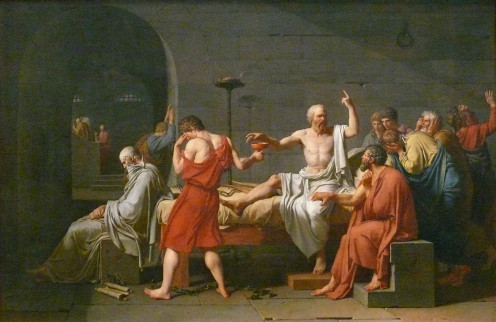
After the death sentence but before the actual execution, several of Socrates' students collected enough money to bribe a prison guard long enough to let their teacher escape and flee Athens, but Socrates refused to run. Although Plato could not bring himself to attend the execution of his beloved teacher, his dialogue, Crito, tells the events of Socrates' last hours. Socrates insists that he does not fear death, and if the citizens have agreed that he must die then he must die for he cannot talk about the importance of following the will of the people and then run when it turns against him. He was also afraid that his students would then face trial for helping a condemned man escape.
When the men came with his cup of hemlock, poison, he readily drank it, while many of his students watched in horror. In the end, Socrates tells Crito that they owe a rooster to Asclepius, the god of medicine, and for him to remember to pay the debt. Some believe this meant that Socrates saw death as a cure for his misery.
So what exactly did Socrates believe? That is the million dollar question. Since Socrates never wrote down any of his own thoughts, we have to rely on his students to tell us what he told them. The problem is that there is no way to separate where Socrates ends and Plato begins. One thing we do know is that Socrates asked far more questions than he ever answered. While it is fine to have an inquisitive mind, one must be able to take a stand on a certain number of things. For Socrates, his stand seemed to be on virtue. He believed that it was more important for a person to be virtuous, morally good, than to be wealthy or even successful.
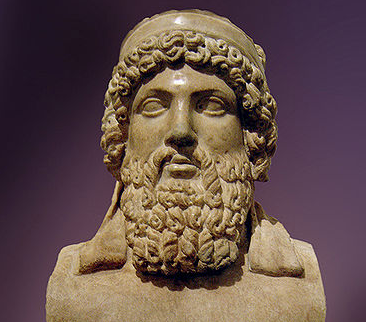
Plato
Unlike Socrates' claims to come from a common family, Plato came from one of the wealthiest families of Athens. He was a brilliant student and excelled at everything from music, sports and grammar, subjects taught to all young Athenian boys. Because he was so bright, his father, Ariston, wanted to provide the best education available for his son. His father and mother, Perictione, had three other children two brothers, Adeimantus and Glaucon, and a sister, Potone, who would become the mother of Speusippus, Plato's nephew and later the head of the school Plato would start. After his father's death, his mother married her own uncle, Pyrilampes, and gave birth to another son, Antiphon. Plato would include all of his family members in his writing and appears to have been very proud of each of them.
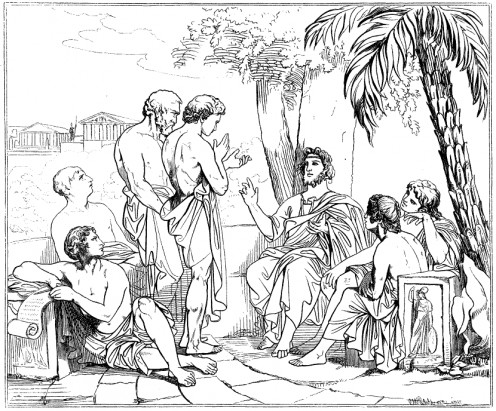
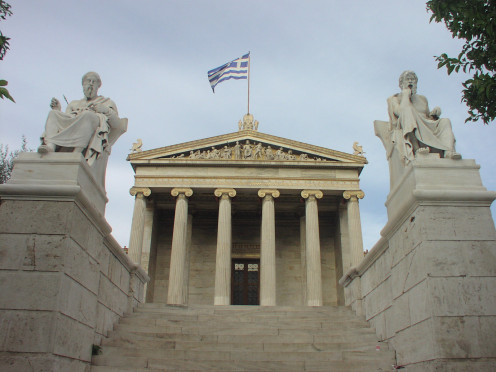
Plato studied philosophy, ethics, religion, mathematics, logic and rhetoric; the art of persuasion, but after the death of Socrates, he did extensive traveling around the Mediterranean. While traveling in Italy, Dionysius I, the tyrant ruler of Syracuse on the island of Sicily, invited Plato to come there and teach his brother-in-law Dion. As a result, the philosopher became caught up in a family with a great deal of problems. Dion wanted Dionysius to appreciate the ideas of Plato as he did, but Plato did not approve of tyranny, oppressive rule over the people. Dionysius at first, wanted Plato executed but allowed him sold into slavery for what he took as insults, The philosopher was eventually released and allowed to return to Athens.
When Dionysius I became ill, family matters heated up again. Fearing that his father would turn overrule to another family member, Dionysius II poisoned his father before he could say or do anything that would result in his not taking the throne. Apparently, Dionysius I had feared that someone would kill him for power and had his son locked away his entire life. When it was time for him to rule, however, he did not have the skills necessary for the task. He was wild and out of control at a time when Syracuse had major issues with their African neighbor Carthage. His uncle, Dion, thought having him study under Plato would help the situation, and the philosopher was again invited to Syracuse.
At first, the training helped. Dionysius even claimed he didn't want to be an oppressive ruler any longer, but soon those in Syracuse, with some influence over the young tyrant, came between the ruler and his uncle. Dion was exiled from Syracuse and Plato was put in jail, though he was treated well. Eventually, Dionysius allowed Plato to once again return to Athens.
After what was probably his first release from Syracuse, around 385 BC, at the age of forty, Plato returned to Athens to start his own school of higher learning, The Academy. This school would flourish until it was closed in 84 AD, by Lucius Cornelius Sulla, the Roman dictator who ruled just prior to Julius Caesar. It would later be reopened in the third century AD by the Neoplatonism (new Plato) movement. It would remain open until Emperor Justinian I closed it in 529 AD out of fear paganism was being taught.
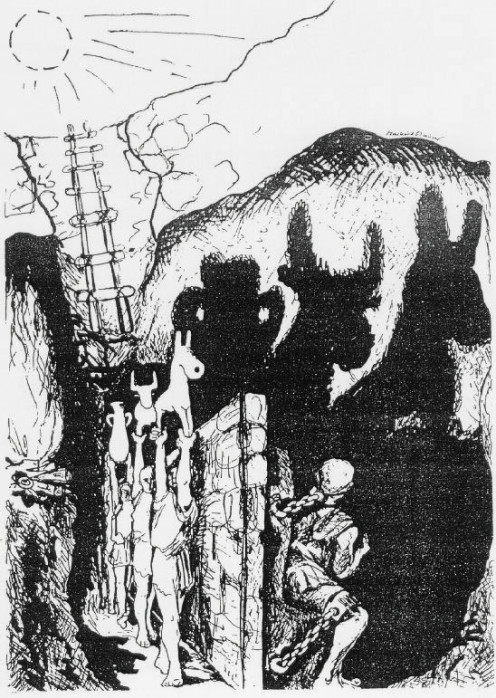

While giving the credit for his ideas to his teacher, Socrates, Plato expresses the idea that knowledge is a gift received from the gods as opposed to something learned through study. He also argues that just because you cannot see or touch something, it does not make it any less real. In his dialogue, Republic, Plato, through his mouthpiece Socrates, uses the allegory of the cave to explain this concept. In it, he tells of people who have been chained facing a wall inside of a cave for their entire lives. The closest glimpse they get of anything from the outside world are shadows on the wall. They try to make sense of what they see and to name objects, but no matter how hard they try, they will never gain a true understanding of what anything is. He goes on to explain that philosophy is like being one of those people in the cave who has been set free into the world to learn what the world really is.
Plato's Theory of Forms is another concept he is well known for, and though I consider myself an intelligent person, I have yet to find an explanation of this theory I fully understand. It seems to involve the idea that nothing we see is the real thing, only a mere copy. In our minds, we have an understanding of what every real, perfect, thing is (because we lived in the world of Forms before we were born), and when we see a copy of one of these objects we use the Forms of what we know the perfect thing to be to identify what we call the object. Take for example a banana. This piece of fruit has many Forms; yellowness, elongatedness, curveness etc. Without a combination of these things, we would not recognize a banana when we saw one. Even when a banana is still green or has turned brown, we can still recognize the object as a banana because we can connect it with the perfect Form of a banana. If we saw a piece of fruit with the yellow of skin of a banana but shaped like an apple, we would have no idea what it was because we do not know the Forms for such an object. If you do not agree with this idea, do not beat yourself up over it. Plato's student Aristotle, himself considered a great thinker, did not completely accept all of this either.
What more Plato thought, we will never know as even he, according to Aristotle, did not write down all of his teaching. He felt that somethings could not be learn from reading, and he also feared some of his ideas falling into the wrong hands. When your teaching is killed for running his mouth, you can certainly understand the sentiment. Plato died peacefully in his sleep.
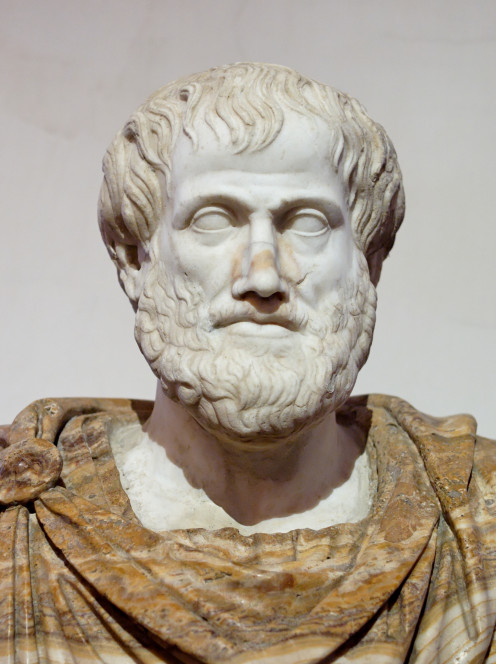
Aristotle
Aristotle was born in 384 BC in Stagira on the Chalkidiki peninsula. If this part of Greece does not sound familiar, it could be because its only claim to fame is being the birthplace of Aristotle. His father, Nicomachus, was the physician to the king of Macedon, who at the time was Amyntas. Amyntas was the father of Philip II and grandfather of Alexander III (the Great). For this reason, it is believed that Philip and Aristotle had a relationship prior to the king requesting the philosophy to teach his son.
At eighteen, Aristotle was sent to the one place in Greece where a young man could get an advanced education, The Academy in Athens. He did not leave until he was thirty-seven, but it was not because he was a slow learner. Aristotle was a well rounded scholar studying in biology and zoology in addition to the more common philosophical concepts of physics, metaphysics, logic, ethics, rhetoric, and politics. As any educated Greek would, he also studied in the arts of music, poetry and the theater.
Following the death of Plato, he left Athens and traveled different parts of Greece and its colonies. Arguments arose as to why the philosopher left. He claimed he did not approve of how Plato's nephew Speusippus was now running the school. Some say his difference of concepts of philosophy were not in line with Plato's or his school, although that does not seem to have bothered Plato any. Still others say that Aristotle was concerned that Philip II's activities in Macedon were now concerning southern Greece, as well they should have because he eventually conquered them. Aristotle did not want any anti-Macedon sentiment coming back on him.
During his travels, he met and married a girl named Pythias. The two of them had a daughter also named Pythias, but not long after this, Philip requested Aristotle come to Macedon and teach his son Alexander III.
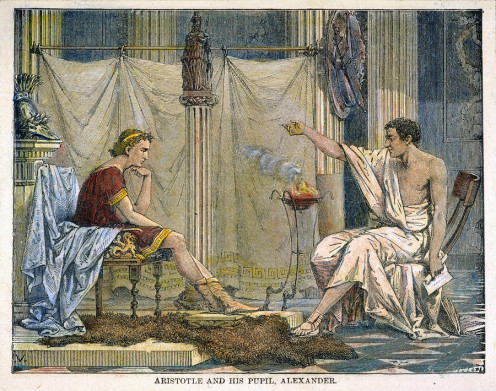
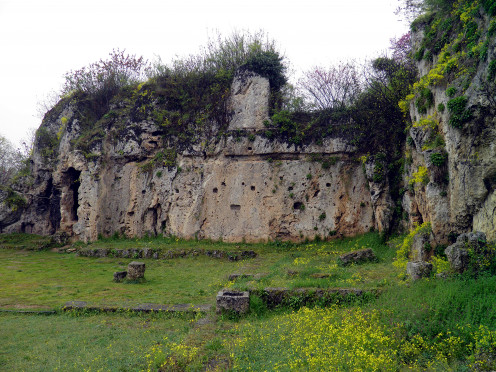
Aristotle was highly rewarded for agreeing to come teach the thirteen year old and his schoolmates. Philip rebuilt Aristotle's hometown, Stageira, which Philip had destroyed in battle then free the surviving citizens from slavery and return them to their home. He also provided a location for the royal school. This new royal academy was located at the Temple of the Nymphs. A place with a strong religious/mythological existence. In addition to Alexander III, future ruler of the known world, Aristotle taught his classmates, boys of aristocratic parents, Ptolemy, who would become pharaoh of Egypt, Cassander, who would become the king of Greece, and Hephaestion, Alexander's best friend and some say longtime lover. Aristotle taught the boys in a great many disciplines, and it was through Aristotle that Alexander developed his love for the poems of Homer and his tales of the Trojan War. When Alexander turned sixteen, his time in school ended, as he became a general in his father's army. The year before Philip II's death and Alexander ascended to the throne as the Macedonian king, Aristotle returned to Athens.
Once back in Athens, the philosopher started his own school. It was called the Lyceum. Over the next twelve years, Aristotle stayed in Athens teaching and writing his own ideas. During his time in Athens, his wife died and he remarried this time to a woman from his hometown. Her name was Herpyllis and they had a son named after his father, Nicomachus. As a teacher, he advanced his own learning and now included psychology, economics, and geography among other disciplines.
Aristotle stayed in contact with Alexander the Great, through letters, throughout the young conqueror's life. Their relationship grew strained, however, when Aristotle criticized some of the king's actions when he, Alexander, slipped deeper into what some believed was the madness of believing he was the son of Zeus/Amun-ra and therefore a god. When Alexander killed his own accompanying historian, Callisthenes, for openly disagreeing with Alexander's demand that his men bow down and kiss his feet in a show of respect, as the Persians did their kings, the relationship between Alexander and Aristotle was all but destroyed, as Callisthenes was Aristotle's nephew.
When Alexander the Great died, Athens, like many other Greek cities, turned against Macedonian rule. As a result of that, some of the citizens turned against Aristotle. Just as they had done to Socrates, they started leveling charges against the philosopher. He fled to the island of Euboea, the birthplace of his own mother. It is said that his reason for leaving was that he would not allow Athens to sin twice against philosophy. This, of course, would have been a reference to what the citizens had done to Socrates. Aristotle died sometime later that year while still in Euboea. His school continued, however, until it too was shut down by the Roman dictator Sulla in 84 AD.
In answering the questions of what Aristotle thought and taught to his students, it is not so much a new or advanced way of thinking in so much as it is a greater understanding of many things through science. He made advanced in just about every avenue he investigated, and while he did not always get things right, compared to what we know today, he made many good suggestions based on his limited technology. Consider the fact that he did not even have a clock or the ability to dissect a human body, as it was against the laws of the gods at the time. One reason for all of these breakthroughs was from his development of the earliest form of logic. He is considered the father of inferring conclusions through deductive reasoning.
While many of the citizens in Athens and Greece as a whole did not truly appreciate philosophy and/or these three great thinkers, and some of their theories proved to be inaccurate, today we understand that they were beginning to question not only what things were but why things were. Today, we as a society are not happy unless we know everything there is to know about even the tiniest element of a thing, like atoms. We also want to know when and where everything has ever been and how that thing was used our could be used in the future. In reality, all of our curiosity began with Socrates, Plato and Aristotle.








